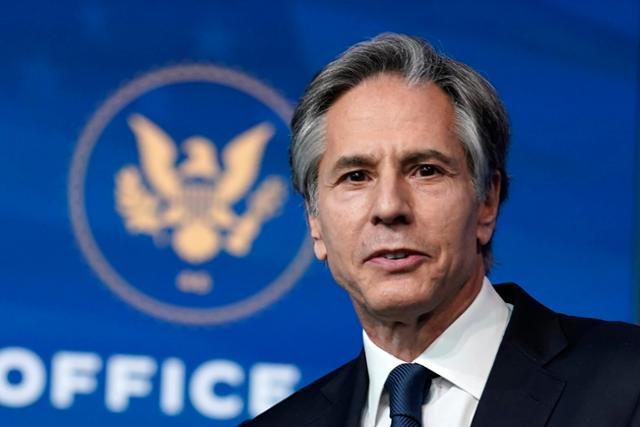Covers sensitive issues such as Taiwan, Hong Kong and Xinjiang
Blincoln “I will ask you to take responsibility for the threat of India and the Pacific”
Yang Jietsu “The US must adhere to the principle of’One China'”

US Secretary of State Tony Blincoln speaks in Wilmington, Delaware in November, when he was nominated. Wilmington = AP Newsis
“I will hold China accountable for threatening stability in the Indo-Pacific region” (US Secretary of State Tony Blincoln)
“The United States must abide by the principle of’One China’ and mutual non-interference agreements.” (Yang Jietsu, Chinese diplomatic officer in charge of political affairs)
After the inauguration of the US administration, Joe Biden, the head of diplomatic relations between the US and China, made the first call. As expected, a tight flag fight took place. Sensitive issues between the two countries, such as Taiwan, Hong Kong and Xinjiang, were all discussed.
In a press release on the 5th (local time), the U.S. State Department announced the news that Secretary of State Blincoln made the first phone call after taking office with Political Bureau Yang Zetz, and introduced Blincoln’s major remarks. According to the State Department, Secretary Blincoln reaffirmed in the call that he will work with allies and partners to hold China accountable for threatening stability in the Indo-Pacific region, including the Taiwan Strait, and ignoring the rule-based international system. In addition, Minister Blincoln said that he plans to cooperate in protecting the values and interests shared with alliances and partners.
It did not avoid the long-standing issue of human rights. “The Secretary of State Blincoln emphasized that the United States will continue to support human rights and democratic values in Xinjiang, Tibet and Hong Kong, while pressing China to join the international community criticizing the military coup in Burma (Myanmar),” the State Department said.

In March 2018, Yang Jietsu, a political officer in charge of Chinese diplomacy, is entering the country through Incheon International Airport. Reporter Seo Jae-hoon
The same is true of China that has focused on its own speech. According to central (CC) TV official media, both political bureaucrats said in the currency, “The Taiwan issue is the most important and sensitive key issue in Sino-US relations, and China’s sovereignty and territorial preservation is at stake. The US is’one China’. “We must strictly abide by the principles and public notices of the three major coalitions (the agreement between the two countries on non-interference between the United States and China and reduction of arms exports to Taiwan).
He also warned that “the issues such as Hong Kong, Xinjiang, and Shijang (西藏·Tibet) are Chinese internal affairs, so we do not tolerate any interference from outside forces.” “China will firmly defend the national sovereignty, safety and development interests,” he said.
“The current relationship between China and the United States is at a climax,” said both political officials. “China urges the United States to correct mistakes and not conflict with China, focus on mutual respect and cooperation, adjust disagreements, and develop Sino-American relations stably.” did. “The two countries should respect each other’s core interests,” he said, saying, “China will solidify the path of Chinese socialism, and no one can stop the great revival of the Chinese people.”
The confrontation angle is not new. At the Senate approval hearing, Minister Blincoln said that he would inherit the Donald Trump administration’s hard-line principle on the public. Violation of the (prohibited line) will damage the interests of the two countries.”
The first call between President Joe Biden, who took office on the 20th of last month and Chinese President Xi Jinping, has not yet been made.
Kwon Kyung-seong reporter [email protected]
Subscribe to the Hankook Ilbo News Naver Channel

Balance to see the world, the Hankook Ilbo Copyright © Hankookilbo
